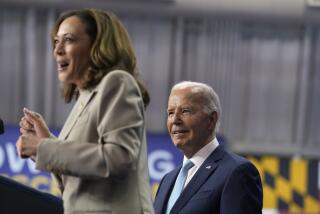Study of Meatpackers’ Power Inconclusive
- Share via
WASHINGTON — The Department of Agriculture, which is spending $500,000 to study whether the nation’s largest meatpackers use their market power to depress cattle prices, may be unable to find the answer because market information is faulty.
A study by a government consultant found no evidence of market manipulation, but could not reach a firm conclusion because economic models are flawed, according to a confidential draft report to the USDA.
The Nov. 16 report by agricultural economists at Virginia Polytechnic Institute in Blacksburg, Va., was obtained recently by Bloomberg Business News.
“We weren’t able to determine whether meatpackers exercise undue market power,” said Paul J. Driscoll, a professor of agriculture economics at the school. “I can’t conclude they don’t influence the market; it’s possible they may influence markets in local areas.”
He called an economic model designed to trace patterns of undue market influence or anticompetitive behavior outdated. “The model’s bankrupt,” he said.
The 11-page draft summary has not been reviewed by USDA policymakers and “will be revised substantially,” said Gerald E. Grinnell, director of the study.
The draft is one of seven parts of a study of concentration in the meatpacking industry ordered by Congress in 1992. Agriculture Secretary Dan Glickman said the report would be released in 30 to 60 days.
“They spent $500,000 for this?” asked Gary Mickelson, spokesman for Dakota City, Neb.-based IBP Inc., the nation’s largest meatpacker.
“When times get tough, the government has a tendency to do studies in meatpacking, yet the answers lie in the basic forces of supply and demand,” he said, referring to record meat supplies.
The study comes amid low cattle prices, a raft of concerns over the marketing behavior of the nation’s four largest meatpackers and their alleged ability to influence prices paid to farmers and ranchers.
“This is what the drumbeat has been out of Washington for the last few months, that the study wouldn’t find any manipulation,” said Mark Klein, a spokesman for Cargill Inc. of Minneapolis. Cargill owns Wichita, Kan.-based Excel Corp., one of the four top meatpackers.
Bipartisan leaders in Congress are questioning the study even before it is complete.
Senate Democratic Leader Tom Daschle of South Dakota and others are pushing a bill to create a commission to judge the validity of the USDA study. Some believe the research, which relies on data from 1992 and 1993, is already outdated.
More to Read
Sign up for Essential California
The most important California stories and recommendations in your inbox every morning.
You may occasionally receive promotional content from the Los Angeles Times.










